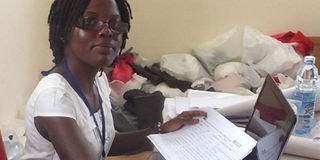Innovation takes Nakibaala places

Grace Nakibaala, 27, is passionate about innovating societal solutions. This is not only taking her places but it is also winning her grants to improve her innovations.
What you need to know:
- Grace Nakibaala,27, has mastered the art of innovation. And through her innovation, especially of the pedal tap, which seeks to control the spread of dangerous pathogens, has gained international acclaim and it is highly recommended for use in low developing countries, writes Emmanuel Mukanga.
Grace Nakibaala, 27, wears a flashy smile revealing the gap between her teeth.
She speaks with a straight face blending into her dreadlocked hair that bounces in and out of place as she passionately speaks about her innovations including the pedaltap.
Nakibaala was born in 1990 to Ruth Nakalembe and Godfrey Kaggwa.
She attended Leo’s Junior, Masaka before moving to Gayaza High School where she now mentors students on innovation.
She is a graduate of architecture from Makerere University and a fellow at the Makerere University School of Public Health
I find Nakibaala at the University of California Berkeley in the US where she is attending a reunion hosting alumni from East Africa to discuss research, training and mentoring.
In 2015 Nakibaala, she says, was recognised as an innovation fellow at the Makerere University School of Public Health, where, with support from Resilient Africa Network, she embarked on researching into safety measures, especially around Ebola isolation centres.
“I needed a dissertation topic,” she says, noting that her innovation journey could have started with researching into the Ebola epidemic that had spread in much of West Africa in mid-2015.
“I obtained permission from my supervisor at the department of architecture to investigate the suitability of the isolation centres at Entebbe and Mulago hospitals,” she says, because: “I wanted to see more than just buildings and create infection-safe architecture plan for people.”
At the isolation centres, Nakibaala noted that hand hygiene was an important aspect which took more than 60 per cent of the safety component around such places.
“Rinsing with tap water in Ebola isolation centres was exasperating. Therefore, hand hygiene needed to be looked at,” she says.
Through different trainings, especially in clinical management of dangerous pathogens, Nakibaala started thinking of a measure through which “I would design a safe isolation centre to create an environment that would provide a safety net against people facing different types of dangerous pathogens”.
The innovation, she reasoned would be her final year project at the university and it is from the project - Proposed national isolation centre for especially dangerous pathogens – that she, through support from Resilient Africa Network, would build a pedal tap that is relatively safe for rinsing, especially in places that are infected with dangerous pathogens.
Using the pedal tap, Nakibaala explains, is relatively safe since one will only use their foot to pump water while rinsing their hands.
“I needed to modify the existing water system to create a no-touch tap. So that is how I came up with the foot pedal tap,” she says.
Initially, some people thought the pedal tap “can’t work” but it has gone on to be recognised as one of the best health innovation winning grants to improve her innovation capacity.
“I have been attached to a network of mentors who offer solutions to problems as well as teaching me how to pitch my innovations,” she says.
Nakibaala hopes to use her company - Innov- Asepsis – as a specialisation centre that controls the spread of infection pathogens for both medical and public health.
She has also, with assistance from Resilient Africa Network, developed an isolation tent cooler and EpiTent that is less humid and user-friendly for environments facing the challenge of dangerous pathogens.
However, this has not been without challenges as Nakibaala believes the biggest obstacle to innovation in Uganda is a rigid education system that discourages deep thinking.
“The government should believe in its own people and support them. Innovation is not necessarily technology. A social scientist or a psychologist can be innovative,” she notes.
Awards
In the 2015/16 Global Health Challenge, Nakibaala’s team which was composed of Issa Sevume, a mechanical engineering student and Molly Mbazira, a medical student, emerged third for the ‘Pedal Tap innovation winning a cash reward of $5,000 (Shs17.5m).
In 2016 Nakibaala won the Youth Spark Innovation Grant.
Pedal Tap has also been selected among the top 38 at the innovation market place at MIT Boston.
The Pedal Tap also became second at TechCon2016 earning a cash reward of $1,500 (Shs5.25m).
What her supervisor says
“She is a focused, self-driven and passionate woman. I supervised her project in the final year and she was eager to discuss her ideas and how to realise them. Courses like the theory of architecture and graphics are meant to awaken the latent potential of the person. What Grace is doing is for the community, many students have heard about her and she has become a role model for the girl child. More people need to know about the abundant opportunities out there for innovative minds,”
Dr Stephen Mukiibi, head of the architecture department, Makerere University.




